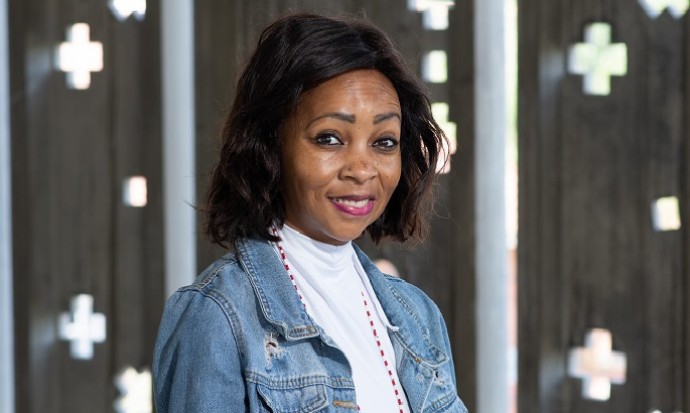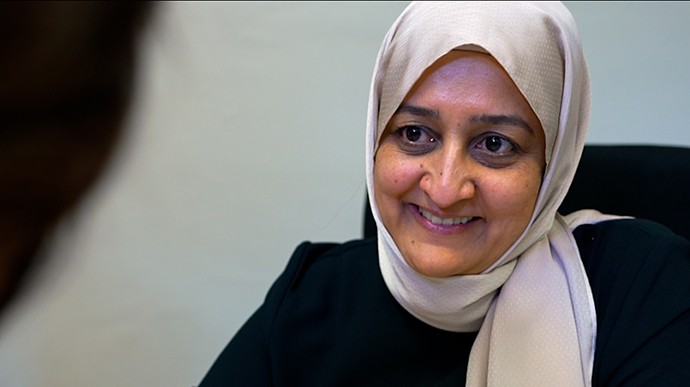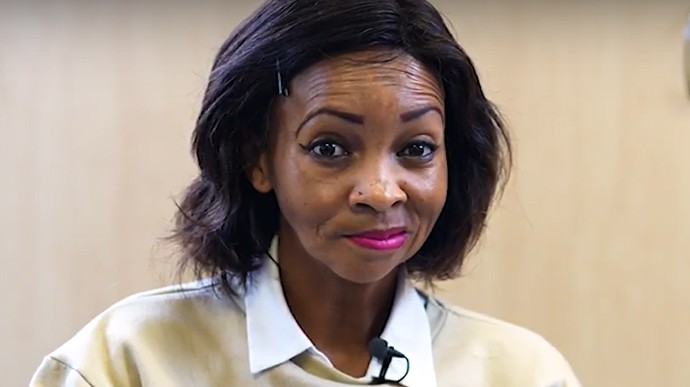
Constance Ntuli has been working at the Centre for Augmentative and Alternative Communication at the University of Pretoria (UP) since 2013. She was introduced to the centre in 2009 when she was invited to participate in a youth empowerment programme there. The programme was geared towards youth and young adults who have little or no functional speech, and who rely on assistive technology to communicate in their daily lives.
Since joining the centre, Ntuli – who makes use of augmentative and alternative communication devices (AAC) – has upskilled herself by gaining knowledge and experience in AAC through various projects, research and training programmes. Ntuli is also part of the UNICEF Youth Forum at the centre, and is involved mainly in advocacy work, often delivering talks about her lived experience.
She says her work contributes to the betterment of the world because she is committed to changing people’s mindsets about individuals who have little or no functional speech. “A change in thinking is important – I show people the benefits of assistive technology and how this helps in communicating effectively,” Ntuli says. “I hope that by demonstrating this within my daily life, those who also experience communication difficulties can see that the possibilities are endless.”
Her research matters, she says, because it is about changing mindsets and helping others who, like her, have little or no functional speech. “With assistive technology, and specifically AAC, I can demonstrate how one can live a life of meaning and purpose, and a life of abundance.”
As to whether a specific event or person inspired her, Ntuli names Artscape CEO and disability activist Marlene le Roux. “People like Marlene le Roux inspire me to live a life of passion, purpose and advocacy for others with disabilities,” Ntuli says. “After Marlene was diagnosed, she took the bold and brave decision to not allow her disability to define her.
Ntuli has two other role models: the late Dr Cival Mills and Martin Pistorius. Dr Cival Mills lived with locked-in syndrome and used AAC, and Pistorius is still living with the condition and thriving thanks to AAC. “Both of them authored books and dedicated their lives to advocating for people with disabilities,” Ntuli says. “I hope to follow in their footsteps.”
Her advice to learners and students interested in her field would be to begin with passion about the field of disability. “Be motivated to extend your knowledge by engaging in research. AAC is quite a unique field; you will learn the theoretical side of assistive technology but also engage in the practical aspect by exploring various types of AAC devices.”
In her spare time, Ntuli enjoys going to theme parks. She also loves cooking (and watching cooking shows), fashion and listening to music.
 Story
Story
How do people who cannot speak consult with their doctor and tell them what is wrong?
To answer this, researchers at the University of Pretoria’s (UP) Centre for Augmentative and Alternative Communication (CAAC) in the Faculty of Humanities conducted a study that involved designing a framework to develop health education material for people with complex communication disabilities.
 Web Series
Web Series
Researchers at the University of Pretoria’s (UP) Centre for Augmentative and Alternative Communication (CAAC) in the Faculty of Humanities conducted a study that involved designing a framework to develop health education material for people with complex communication disabilities.
 Web Series
Web Series
Constance Ntuli's research matters because she wants to change mindsets and help others who, like her, have little or no functional speech. “With assistive technology, and specifically AAC, I can demonstrate how one can live a life of meaning and purpose, and a life of abundance.”
Copyright © University of Pretoria 2025. All rights reserved.
Get Social With Us
Download the UP Mobile App